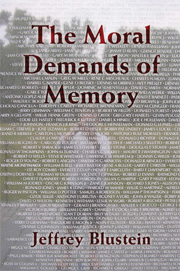5 - The Responsibility of Remembrance
Published online by Cambridge University Press: 05 June 2012
Summary
For everything, in time, gets lost…. But for a little while some of that can be rescued, if only, faced with the vastness of all that there is and all that there ever was, somebody makes the decision to look back, to have one last look, to search for a while in the debris of the past and to see not only what was lost but what there is still to be found.
– Daniel Mendelsohn, The LostRAISING THE ISSUES: ABSENT FRIENDS, DECEASED FRIENDS
If ethical norms govern how one is to behave toward others with whom one has a thick relationship, then broadly speaking, the topic of this chapter belongs to what, in Chapter 4, I called an ethics of memory. Specifically, this chapter deals with ethical norms governing remembrance in the domain of personal and intimate relations. What obligations of remembrance do we have to or with respect to the near and dear – friends, lovers, family members, and so forth? More specifically still, what obligations do we have after they have died? I want to approach this question indirectly by first considering remembrance in the context of an ongoing friendship.
Bill and I have known each other for some time, and when I think about my feelings for him, I have no hesitation saying he is a dear friend about whom I care a great deal.
- Type
- Chapter
- Information
- The Moral Demands of Memory , pp. 240 - 300Publisher: Cambridge University PressPrint publication year: 2008



